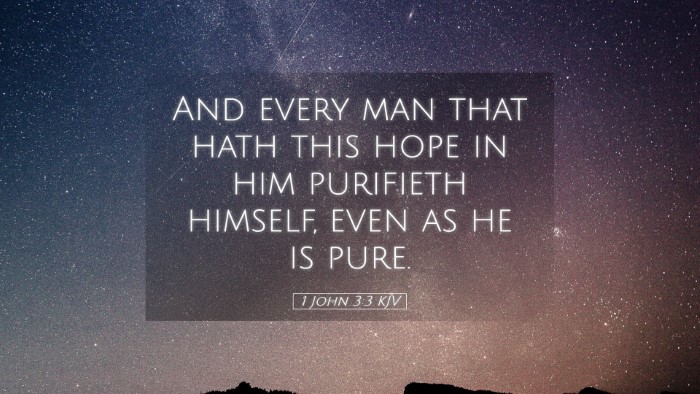Old Testament
Genesis Exodus Leviticus Numbers Deuteronomy Joshua Judges Ruth 1 Samuel 2 Samuel 1 Kings 2 Kings 1 Chronicles 2 Chronicles Ezra Nehemiah Esther Job Psalms Proverbs Ecclesiastes Song of Solomon Isaiah Jeremiah Lamentations Ezekiel Daniel Hosea Joel Amos Obadiah Jonah Micah Nahum Habakkuk Zephaniah Haggai Zechariah Malachi1 John 3:3
1 John 3:3 KJV
And every man that hath this hope in him purifieth himself, even as he is pure.
1 John 3:3 Bible Commentary
Commentary on 1 John 3:3
Verses Reference: 1 John 3:3 (KJV) - "And every man that hath this hope in him purifieth himself, even as he is pure."
Introduction
The Epistle of 1 John presents profound insights on the nature of Christian hope, love, and purity. In this particular verse, Chapter 3, verse 3, the Apostle John highlights a vital connection between hope in Christ's return and the consequent moral transformation of believers. This commentary combines perspectives from notable public domain biblical scholars including Matthew Henry, Albert Barnes, and Adam Clarke, presenting a comprehensive understanding critical for pastors, students, and theologians.
Contextual Background
This epistle addresses the community of believers, encouraging them to remain steadfast in their faith amidst heretical teachings and the moral decay of their surroundings. The overarching theme is the assurance of salvation and the ethical implications of that assurance. Verse 3 encapsulates a key aspect of John’s teaching regarding hope and holiness.
Exegesis of 1 John 3:3
This verse presents a clear link between hope and personal conduct. John asserts that those who possess the hope of Christ's return will respond with action—a purification of their hearts and lives. Each of the key components of this verse can be examined for a richer understanding:
- Hope in Him: The hope spoken of here is the anticipation of Christ's second coming. John emphasizes that this hope should not be passive but should cultivate a proactive approach to godliness. As stated by Matthew Henry, “He that hath this hope sees him as he is and thereby transcribes something of his purity into his own spirit.”
- Purification of Self: The act of purifying oneself is integral to John’s message. Albert Barnes explains that this purification arises from an appreciation of God's character; believers aim to reflect the purity of Christ in their lives. Purity encompasses both moral and spiritual dimensions, urging believers to engage actively in sanctification.
- Even as He is Pure: The standard of purity is none other than Christ Himself. Adam Clarke notes that this aspect invokes a deep relational aspect to purity — believers are called to imitate Christ, not merely as a set of moral rules, but as an embodiment of divine love and righteousness.
Practical Implications
For pastors and theologians, this verse serves as a powerful exhortation to convey to congregations the necessity of aligning one’s life with the hope of Christ’s return. Here are several implications derived from the text:
- Hope as a Motivator: Understanding hope as a powerful motivator can transform how believers engage in their spiritual lives. It instills a sense of urgency in living out their faith actively, not merely in anticipation of future glory but in present righteousness.
- Holiness as Evidence of Hope: The purification process is a testimony to the internal work of the Holy Spirit. Believers are challenged to reflect on how their lives exhibit evidence of this hope through tangible acts of holiness and love.
- The Role of Community: This verse also suggests that hope in the imminent return of Christ fosters community. As believers purify themselves individually, they should encourage one another in this process, creating a culture of accountability and mutual support.
Theological Reflections
This verse raises essential theological questions regarding the nature of hope, grace, and human responsibility. The intertwining of hope and holiness challenges the prevailing notion of a grace devoid of moral consequence. All three scholars emphasize that true hope is transformative and demands a life that reflects the purity and righteousness of Jesus Christ.
Discipleship: This immense responsibility fosters a holistic view of discipleship, wherein believers are continuously being refined into the image of Christ. The aspirational quality of “even as he is pure” provides a perfect model for discipleship.
Conclusion
1 John 3:3 serves as a critical reminder for believers of the profound relationship between hope and ethical conduct. The promise of Christ's return compels the faithful towards a life marked by purity and righteousness. The insights offered by Matthews Henry, Albert Barnes, and Adam Clarke enrich our understanding of this text, urging us to respond to our blessed hope with sincerity in our pursuit of holiness. Thus, may this hope propel us to become not only hearers of God’s word but doers, reflecting the purity of Christ in a world yearning for redemption.


